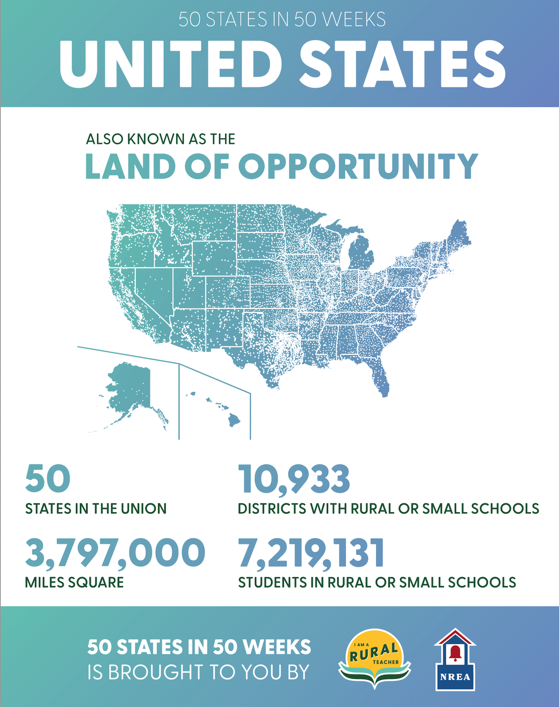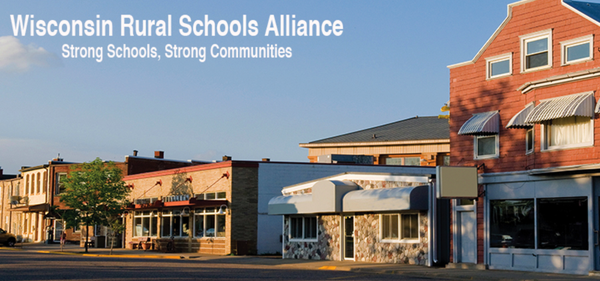November 11-12, 2021
JW Marriott 10 S West St Indianapolis, IN 46204
Call for Proposals March 2021 |
|
| The Rural Schools Collaborative and the National Rural Education Association appreciate NCC's commitment to reaching out to rural teachers and their students. |
|
|
|
Hello Rural Educators,
I hope you are doing well. I wanted to reach out to share information about the National Constitution Center’s free, online classes on the Constitution. We have noticed schools from your state participating in class, and we would love to have your students and colleagues join the fun! Public Scholar Exchanges—live, interactive online classes for your students—are offered live on Zoom and YouTube three days a week. On Mondays and Wednesdays, the first class, at 12 p.m. ET, is for middle school students and the second class, at 2 p.m. ET, is for high school students. Classes are taught by President and CEO Jeffrey Rosen, or another of the NCC’s scholars, and moderated by the Chief Learning Officer, Dr. Kerry Sautner, (that’s me!). On Fridays, special guests join the fun at 1 p.m. ET for a conversation open to learners of all ages. Recent special guests include Supreme Court Justice Neil Gorsuch, filmmaker Ken Burns, American educator Sal Khan, and Congresswoman Mary Gay Scanlon. Through Zoom’s chat feature, students can engage directly with the nation's top scholars, ask questions, respond to prompts, and more! Private Scholar Exchanges—customizable, interactive online sessions—are offered for individual classes. These sessions are tailored to the interests of a particular class and provide students the unique opportunity to interact with constitutional experts. To increase the number of students we reach with the classes, the National Constitution Center has created a Teacher Advisory Council. The Council supports the Center by sharing best practices for teaching constitutional and civic topics—looking at the intersection of U.S. history and current events—and advises the Center on programs and resources that would best support classroom instruction on constitutional fundamentals. We are looking for enthusiastic educators, who will assist the #NCCed team in creating new tools for supporting online learning for students nationwide, to join the Teacher Advisory Council. Learn more and apply here!We want to hear from you. Join the Center’s team for a virtual networking reception as we engage in meaningful conversation around the 2020-2021 school year and our shared mission to build “A More Perfect Union,” one student at a time. The Center’s Education Team will provide methods to strengthen the nation’s civic education work by leveraging access to the Center’s resources. Please feel free to share widely within your networks.
Rural Winter Mixer Thursday, March 4 3:30 p.m. PT/6:30 p.m. ET 45 minutes with Q&A Register below |
|
|  |
As we continue to sort out the impact Covid-19 has on every aspect of our work, the effect of the pandemic on the ongoing and persistent rural teacher shortage has the potential to greatly redefine the way in which we work. Determining the perceived influence of the pandemic in teacher retention will allow us to better serve rural schools and teachers.
This survey is designed to assess the perceptions school leaders, teacher educators, and rural school advocates have toward pandemic-related teacher retirements and retention issues. We want to garner an early sense of how the rural teacher shortage is being affected by Covid-19. Through the responses gathered from this survey, we will be able to shape our services and resources going forward in a way informed to the changing realities on the ground.
On behalf of the National Rural Education Association and the Rural Schools Collaborative, thank you for participating in an exploratory survey. The responses collected from this effort will be combined into a report detailing the perceptions of individuals in the education field about the direct impact of Covid-19 on rural teacher retirement and retention. All responses will be kept anonymous and presented in aggregate. |
| | Read More |
|
|
| America’s rural communities are the bedrock of our nation’s economic and fiscal well-being, but they are frequently under-resourced, struggling to gain the attention of policymakers and investors. That’s why Achieving the Dream launched Building Resiliency in Rural Communities for the Future of Work, an initiative that aims to increase equitable student success by strengthening rural colleges’ capacity to prepare students for careers in today's and tomorrow’s digital economy. |
| | Read More |
|
|
| Rural State Affiliate Spotlight |
|
|
|
Congrats to Dr. Jan Miller and the University of West Alabama! Our Alabama Rural Affiliate! |
|
|  |
When Gov. Tony Evers announced his biennial budget on Tuesday, including a hefty $7.7 billion proposed for various education programs, Kim Kaukl felt like the concerns of rural Wisconsin were being heard. “I feel it’s a strong budget,” says Kaukl, executive director of Wisconsin Rural Schools Alliance (WiRSA). “It has basically everything that our members were looking for in this budget. It checked pretty much all the boxes for us.” Wisconsin Rural Schools Alliance represents 165 rural school districts and roughly 121,500 students. Wisconsin has approximately 310 rural school districts, representing 44% of Wisconsin’s K-12 students. Kaukl believes Evers’ proposals — including a huge boost for early childhood programs, special education funding, and rural broadband services — will aid communities struggling to rebound during the COVID-19 pandemic. Evers proposes a general per-pupil increase from the state, and his budget provides a hefty increase in special education funding of $709 million. Currently, the state covers less than 30% of districts’ special education costs; Evers’ budget proposes 45% to start and rising to 50%. “We are hoping to get to 60%, but this is something we’ve been pushing for forever,” says Kaukl. “What people need to understand is that this piece [of the budget] helps all schools, and it helps all students because special ed has been so underfunded at the state level for so long that many of our districts are having to use money from their general fund to offset their special ed needs.” |
| | Read More |
|
|
| The recently released budgets from the House of Delegates and Virginia Senate have promise. A 5% raise for teachers as proposed by the House and increased funding for support staff as proposed by the Senate are steps in the right direction. These and other budget recommendations greatly are appreciated and needed. However, an equity mindset is missing from both proposed budgets. The word equity has been used in many discussions during this session, the past session, and the election of 2019. It seems, however, that equity has become more of a buzzword than a policy driver. I am thrilled that equity is part of the conversation, but our students won’t experience equity short of action. The first example of inequity in the released budgets is the increase to cost of competing adjustment. The House increased this funding stream, which benefits divisions in Northern Virginia, by $13 million. |
| | Read More |
|
|
|  |
Rural schools in Arizona want to get their fast internet connections beyond their buildings and out into the community, where broadband can help provide online learning for students and families. “It might be a cliché to say it at this point, but the ‘digital divide’ is a real problem in rural communities, and it’s the same in the rural counties here in Arizona,” said Wes Brownfield, ARSA’s executive director and a retired rural school principal himself. “Building high-speed, dependable internet service to student homes is necessary for successful online learning, and right now, in many rural areas, fast and affordable internet access is just woefully inadequate.” The Final Mile Project is identifying “anchor institutions, such as schools, libraries or hospitals, with existing high-speed fiber capacity,” Brownfield said. Those institutions can then host towers with the ability to broadcast internet service to nearby homes. Current technology and regulations can achieve an average reach of a seven-mile radius using this model. |
| | Read More |
|
|
| Rural Educator Weekly Spotlight: |
|
|
|
|  |
This article gives meaning to innovating promising practices in high poverty rural contexts, as experienced by the Rural Math Excel Partnership (RMEP). The project sought to develop a model of shared school-family-community responsibility to support student success in foundational math courses as preparation for science, technology, engineering, mathematics, and health (STEM-H) careers. RMEP was one of the two rural development grant awards in the 2012 federal fiscal year, the first year for awards in the rural priority area of the U. S. Department of Education’s Investing in Innovation (i3) program. High poverty rural areas may have major implications for the fidelity of implementation and measurement of intended impacts that raise important questions about project organizational structures, capacities, and evaluation needs. If significant external funding and a partnership approach are key catalysts for innovating solutions to educational challenges, the answers to 10 questions of readiness could have major implications for project success. |
| | Read More |
|
|
| At the most recent National Forum to Advance Rural Education in November of 2020, editor Devon Brenner led a panel discussion about current and future efforts to expand broadband access for rural schools and communities with Brandon Presley, Public Service Commissioner for the Northern District of Mississippi; John Conradi, executive director of Connect Americans Now; and two Mississippi school leaders, Wayne Rodolfich, superintendent of the Pascagoula-Gautier School District, and Tyler Hansford, superintendent of Union City School District and chair of the Mississippi Rural Education Association. Their conversation is excerpted here. Some portions have been edited for cohesiveness and clarity. |
| | Read More |
|
|
| Pam Buffington and Mara Casey Tieken discuss the educational challenges brought about by COVID-19.
In 2020 has been an exceptionally different—and difficult—school year for many of the 9 million students who attend rural schools in the United States. Not only has hybrid and remote learning replaced face-to-face instruction, but the pandemic has drastically affected the economic stability and physical health of many families in rural communities. These impacts will continue to be felt long after a vaccine is found. In this podcast, Pam Buffington, director of Rural STEM Initiatives at EDC, and Mara Casey Tieken, an associate professor of education at Bates College, discuss how rural schools are adapting to the current realities—while continuing to meet the needs of students and their families. |
| | Read More |
|
|
| “What I would say to any leader is to be as truthful as possible and available as possible and to stay with it. This too shall pass, and I really think we will learn some great lessons” Superintendent Shila Adolf out of the Valley School District RE-1 with honest and inspiring words about how we as educators can manage challenging times. This too shall pass! To listen to the entire episode, be sure to click this link and follow Redefining Rural on all our platforms: https://linktr.ee/redefiningrural |
| | Read More |
|
|
| Our Partners and Sponsors: |
|
|
|
|